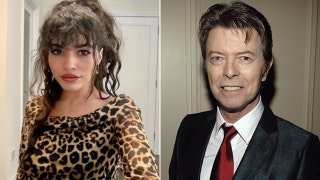Actress shares experience of being scanned for AI
Actress Sandra Miska, a member of SAG-AFTRA, explains what it was like having her likeness scanned for AI and if she would agree to it again.
The Writers Guild of America, which has been on strike for over three months, is meeting with the Alliance of Motion Picture and Television Producers (AMPTP) on Friday to potentially discuss next steps. Meanwhile, SAG-AFTRA, the actors’ union that joined the WGA on strike last month, still has not seen any movement toward resuming talks with the AMPTP.
One of the major sticking points is the potential use of artificial intelligence (AI) to replace background actors with digital copies.
Some background actors have already been scanned by productions but remain unaware if or how their likeness is being used, causing concern about their future career prospects.
A background actor based in Atlanta with 30 years of experience in the industry, who wished to remain anonymous, spoke with Fox News Digital and said he had been scanned for three projects for an undisclosed major production company.
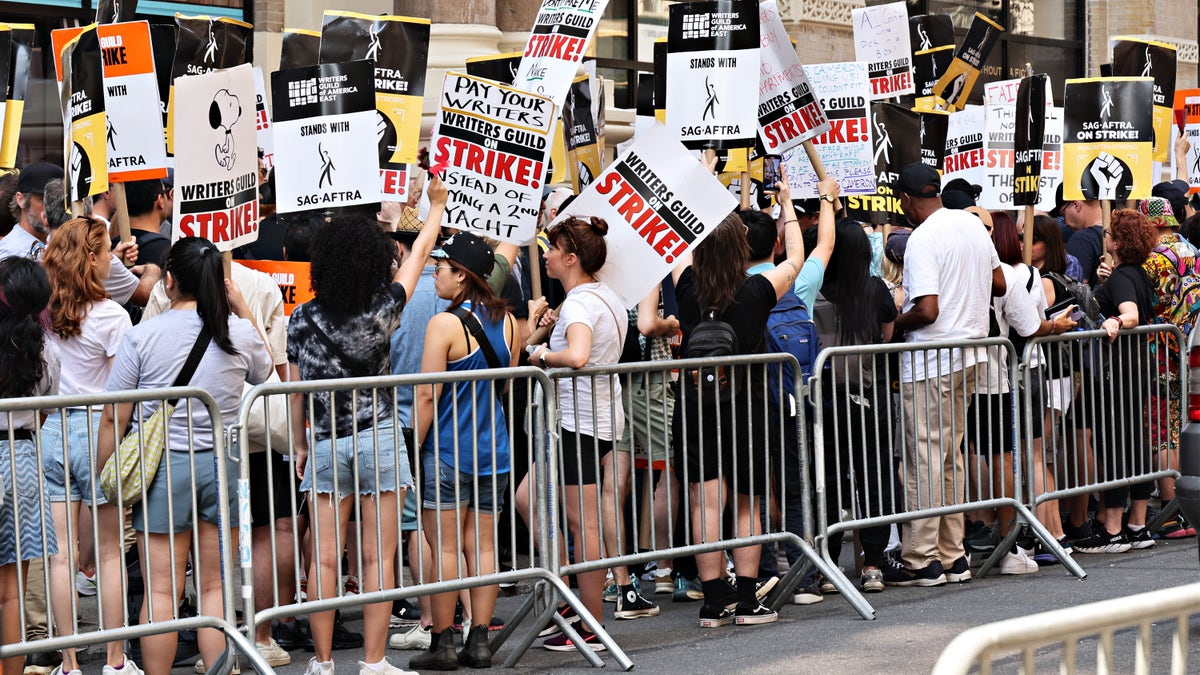
Members and supporters of the WGA and SAG-AFTRA picket on day 100 of the WGA strike outside Netflix and Warner Bros. on Aug. 9, 2023, in New York City. (Cindy Ord/Getty Images)
He described being ushered into a vehicle with "500 maybe a thousand cameras." "It was so many cameras around us, it was like a dome, and it’s inside a truck, and it’s mobile, so they can go from production to production," he explained.
"It’s pretty crazy with all the lights, they had us in poses from every angle you can imagine … it’s very extensive," he continued, adding the process took approximately 15 minutes and required him to perform various poses and facial expressions.
"They told us, and I don't necessarily believe them, but they told us that it was only for this purpose, this movie that you're working on," he said.
"My digital version of me could be out working without me and taking my job."
He speculated, "They could use our images without us getting paid….my digital version of me could be out working without me and taking my job."
According to him, no additional paperwork was signed, nor was he informed what exactly the body and facial scan was going to be used for by the production.
He also stated that "they didn’t give us a choice" when it came to being scanned, claiming that if they were not working at that moment on set, they were referred to the vehicle for the scan.
"They could easily sell out to different productions. I don't know that they will. But the thing that scares me is … about how they could misuse it," he said, adding that it could impact not just actors but casting directors and agencies.
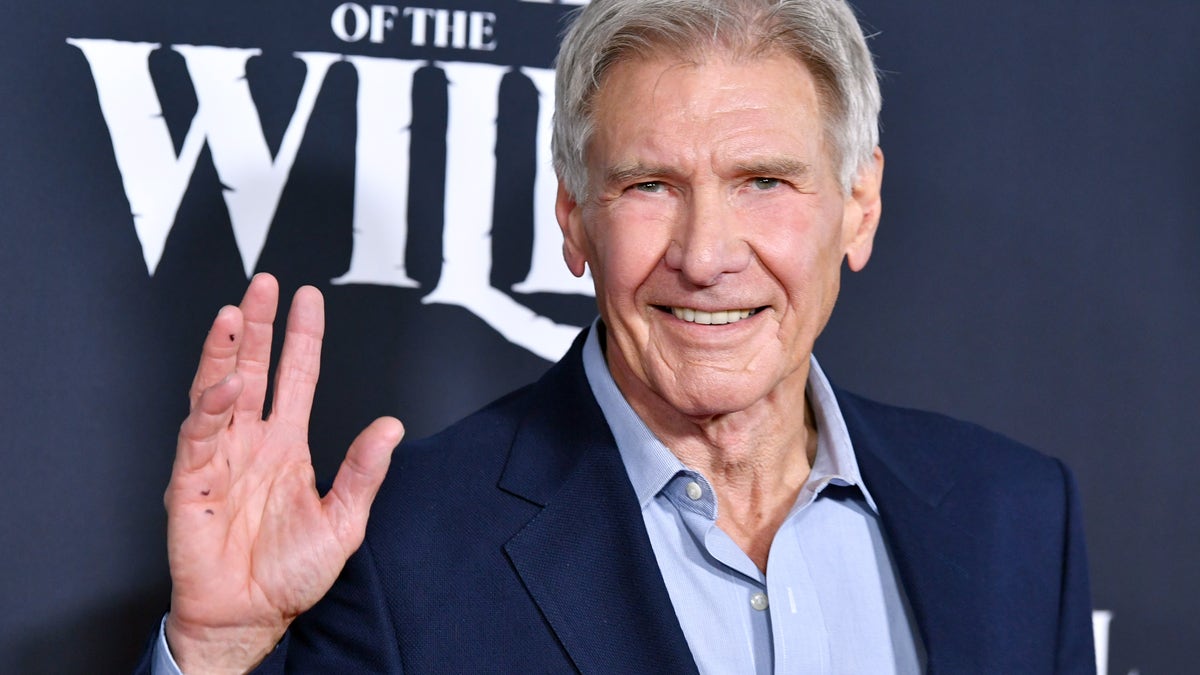
Sandra Miska, who has worked as a background actor for 10 years and became a SAG-AFTRA union member in 2015, recalled her experience being scanned for the film "The Call of the Wild," starring Harrison Ford. (Getty Images)
Another background actress recently shared her experience with NPR, saying she was scanned for a Disney+ series. However, she did not give her permission for her digital replica to be used in scenes, per the outlet.
Sandra Miska, who has worked as a background actor for 10 years and became a SAG-AFTRA union member in 2015, recalled her experience to Fox News Digital being scanned for the film "The Call of the Wild," starring Harrison Ford.
Miska said she was scanned while wearing 1890s period costume for a crowd scene but could not recall for sure if she signed any additional paperwork that informed her if there was any purpose for the scan beyond the movie.
WATCH VIDEO: Actress shares experience of being scanned for AI
"…I believe we were told it was just for this movie because it was such a large scale scene, and I was wearing a period costume, so I didn’t think much of it, but then I started thinking about it recently when the subject of AI has been in the news."
"It was just such a new thing at the time. I didn’t think much of it, of what it meant, because a lot of times doing background, they’ll use CGI to make it appear like there are more people than there actually are," she added.
GEORGE CLOONEY SUPPORTS ACTOR'S UNION STRIKE, SAYS IT'S AN 'INFLECTION POINT IN OUR INDUSTRY'
The use of CGI has been around for quite some time in the entertainment industry, creating vast armies in films like "Avengers: Endgame," or "The Lord of the Rings" franchise. TV series use it as well, like the Apple TV+ series "Ted Lasso," which recently made headlines for the using the process known as "tiling," essentially copying and pasting real people filmed on a green screen and placing them around the stadium.
Where SAG-AFTRA and AMPTP are butting heads is the use of real-life people being scanned and duplicated and the best way to inform and compensate them for that use.
Chris Mack, a non-union actor based in Los Angeles, has not had his likeness scanned for any projects, and would not consent to it if met with the proposition.
"I would refuse because I want to actually have a career as an actor," he said. "I want to have a career, and if I were to be scanned, essentially you’re asking me to give up my most valuable asset, which is me."
He added, "Most of my friends that are also background actors or actors in general feel the same way, they don’t want their likeness taken, that would hinder their careers, so I don’t know anybody that has [agreed to it]."
WATCH VIDEO: Actor reveals why he would ‘refuse’ to be scanned for AI
Miska said she was not sure if she would agree to the process again.
"Knowing what I know now, I'd probably say no because knowing how it hurts the industry and [that it] takes away jobs from people," she said. "And some people, like on Twitter, were saying like, ‘Oh, it's just, it's these young and hungry people that get taken advantage of doing background.’ But there's a lot of like people of all different ages to backgrounds, people who've made a whole career; a lot of senior citizens. So, it's just not fair to them to be involved in that."
'JEOPARDY!' CHAMPION CRITICIZES SHOW FOR FILMING THROUGH WRITERS STRIKE
Jeff Olan, owner of Jeff Olan Casting, has decades of experience working with background actors on projects like "Pulp Fiction" and "Grey’s Anatomy," and is deeply concerned about AI’s impact on the industry, particularly where it comes to informed consent for background actors.
"I would refuse because I want to actually have a career as an actor."
"I think what's happened is it's been kind of a hush, hush and nobody really knew anything about it," he said. "They had no idea what it was all about. Extras have no idea. And extras usually don't fight it because when an extra gets to a set, whether it's a movie or TV show or whatever, they're hired for the day, and they're doing whatever the production wants them to do."
Olan feels that in two to three years, "our industry, the way it is with the extras casting, I believe, it’s not going to be gone, it’s not going to be obsolete. But we are getting into a dinosaur type thing here."
He does not expect actors to be replaced entirely, but for background, unless they are particularly close to the main performers in a scene, it will more than likely be populated by AI.
And Olan is not entirely opposed to AI, but said, "I think we need to slow it down. If the studios could just slow it down… But then when you're dealing with multi-billions of dollars, they don't really care. And it's obvious they don't care about all these people that are losing out on money right now."
"But the bottom line is every single extra deserves payment if they're going to have [a scan for AI] done that day, they should get a little extra money that day for it. And then any time that their image or likeness or anything is used, they should get some sort of residual," he added.
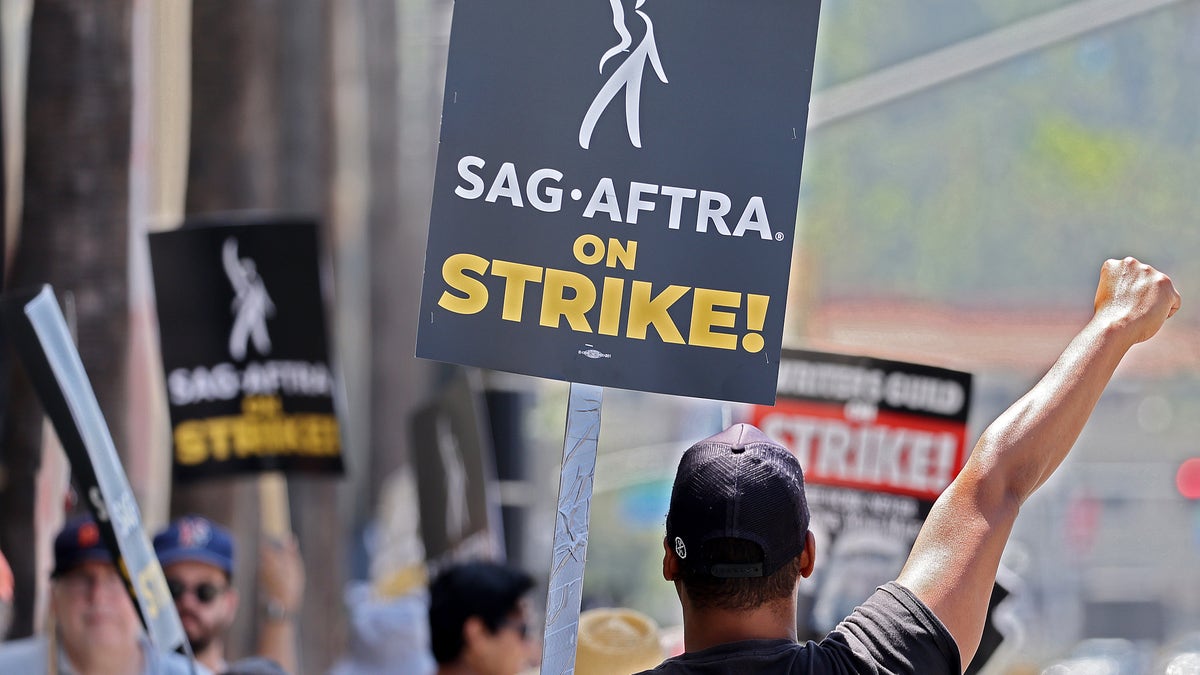
Among the issues being negotiated between SAG-AFTRA and the AMPTP are the use of AI and how actors, including background actors, will be informed and compensated. (Mario Tama/Getty Images)
Talks between SAG-AFTRA and the AMPTP are currently at a standstill. SAG-AFTRA president Fran Drescher told "Today" earlier this month the union is in it for the long haul.
"We have financially prepared ourselves for the next six months. And we're really in it to win it," Drescher said.
A source close to SAG-AFTRA told Fox News Digital the union is willing to come back to the table any time unconditionally and that Drescher’s comments highlight members’ dedication to achieving a fair contract.
They also reiterated the concern about AI replicas being used without consent or compensation, and the right to control one’s own image is fundamental and a human rights issue.
On the union’s website, they state that in a previous negotiation before the strike, the AMPTP "failed to address many vital concerns, leaving principal performers and background actors vulnerable to having most of their work replaced by digital replicas."
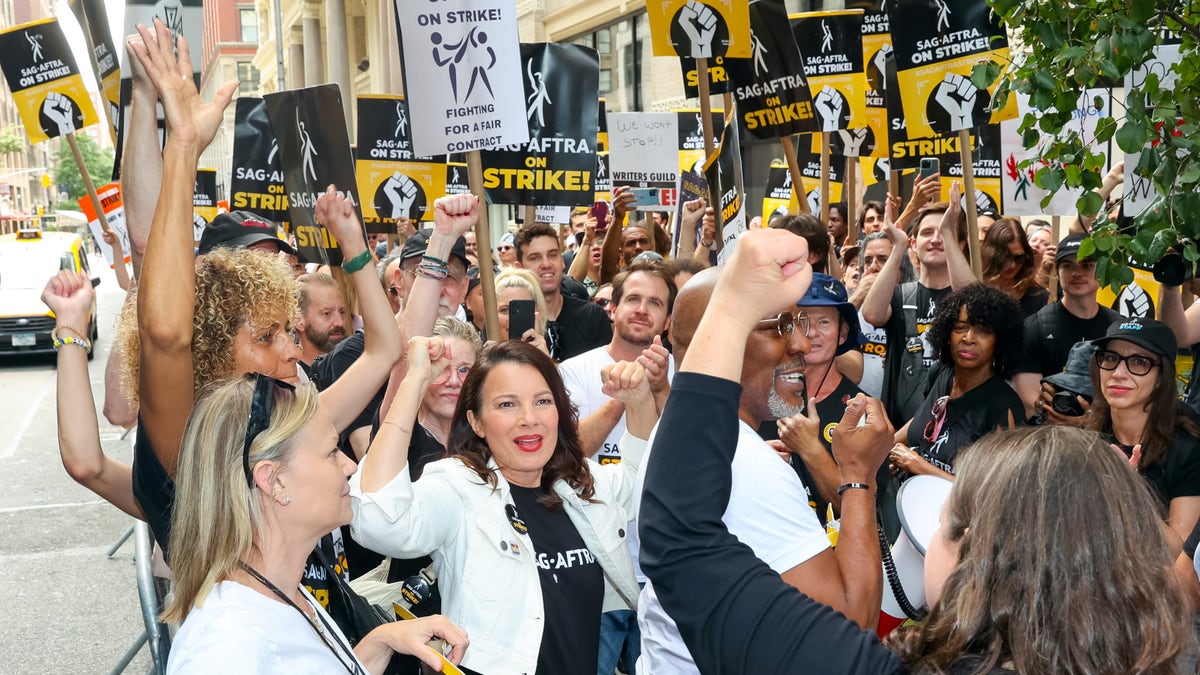
Fran Drescher, president of SAG-AFTRA, recently told "Today" that, "We have financially prepared ourselves for the next six months. And we're really in it to win it." (Jose Perez/Bauer-Griffin/GC Images)
FRAN DRESCHER'S NEXT ROLE: FROM 'THE NANNY' TO HOLLYWOOD QUEEN AMID ACTORS STRIKE
The site also claims the AMPTP wants "to be able to scan a background performer’s image, pay them for a half a day’s labor, and then use an individual’s likeness for any purpose forever without their consent" as well as manipulate performances and create entirely new scenes without the consent of the performer and without additional compensation.
In a statement provided to Fox News Digital, the AMPTP said, "The claim made by SAG-AFTRA leadership that the digital replicas of background actors may be used in perpetuity with no consent or compensation is false. In fact, the current AMPTP proposal only permits a company to use the digital replica of a background actor in the motion picture for which the background actor is employed. Any other use requires the background actor’s consent and bargaining for the use, subject to a minimum payment."
While talks continued to be stalled, some experts believe the threat of AI to acting is not as intense as some may feel.
Marva Bailer, an AI advisor, noted the assumption that artificial intelligence will automatically be an effective cost-cutting tool could be unfounded.
"I believe that this whole AI building [their] database is probably going to be pretty short-term because to create these additional effects and scenarios does require somebody that has these extra talents," Bailer said. "So it's going to be a balance, and they're going to have to start figuring that out."
WATCH: AI expert explains why artificial intelligence might not save studios as much money as anticipated
CLICK HERE TO SIGN UP FOR THE ENTERTAINMENT NEWSLETTER
She added, "There's absolutely room to pivot, and we're all pivoting, and we're all learning. But in creative fields, there's no replacement for human energy, human connection and community. So we just really want to use these additional tools to fuel that creative process."
Daniel R. Gutenplan, a partner with EPG Lawyers, agrees that AI is very unlikely to replace actors entirely.
"Even ‘digital doubles’ require the work of the actors themselves," Gutenplan said. "When it comes to entirely replacing actors with AI-generated likenesses, I don’t believe there is any technology out there that can do so, or even come close. So, while there is certainly a threat of this occurring down the line, it is just that at this point—a threat."
"And even if the technology were to advance to a stage where a studio could completely replace background or other actors with AI-generated content, it would still require substantial efforts from the [visual effects] team to do so and to integrate that AI-generated content into the film, episodic production, etc. In truth, it might actually require more work from the [visual effects] team, especially given the nascency of the technology," he added.
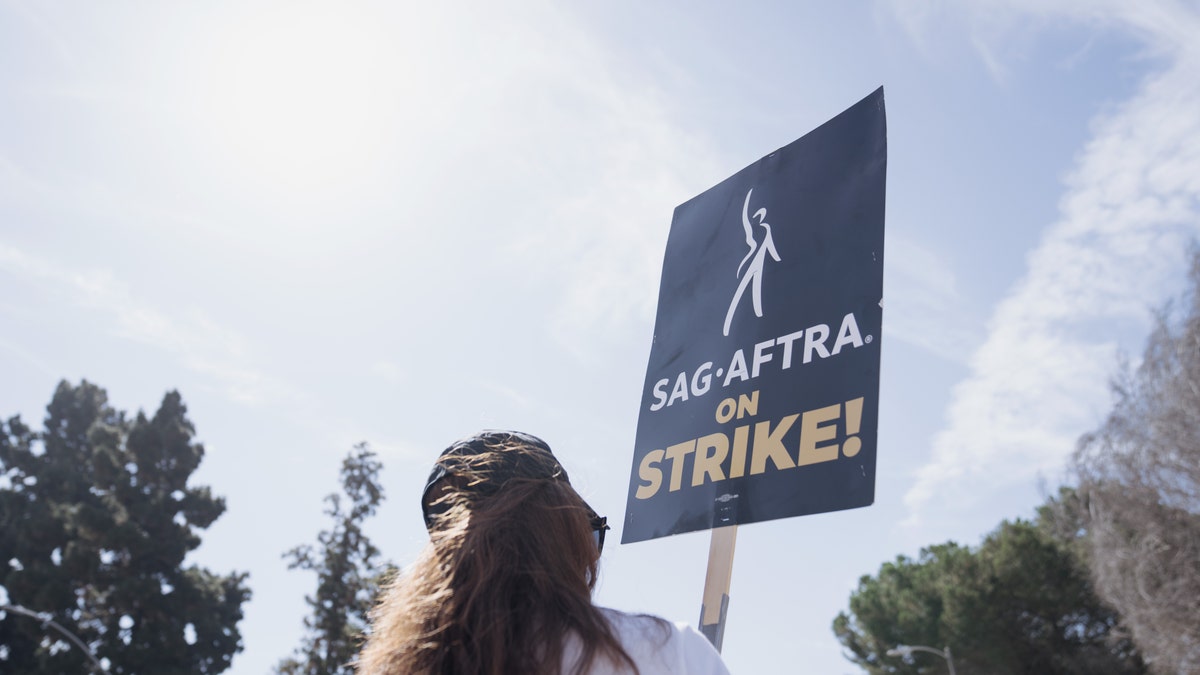
While actors are on strike and fear being replaced with AI, experts claim the threat isn't as imminent as it may feel. (Eric Thayer/Bloomberg via Getty Images)
CLICK HERE TO GET THE FOX NEWS APP
Gutenplan, like Bailer, also feels the human element is one that simply can’t be replicated by AI.
"I believe the film and TV-viewing public will always have a desire to see actual humans in their programming—actors who walk the same streets they do; actors who walk on stage to win awards; actors to whom the public can even look up to and idolize," he said. "The humanistic element remains a major element of our love affair with film and TV, and it is hard to see that changing."
